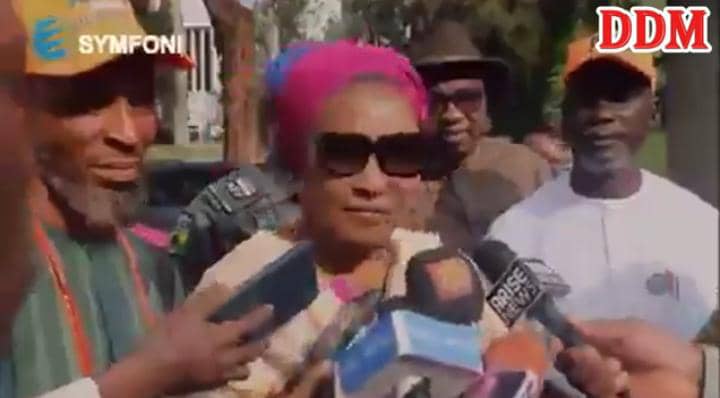Africa
ISWAP terrorists claim responsibility for attack on Red Cross office

The Islamic State-backed faction of Boko Haram, the Islamic State West Africa Province (ISWAP), formerly known as Jamā’at Ahl as-Sunnah lid-Da’wah wa’l-Jihād, has claimed that its fighters attacked an office of the International Committee of the Red Cross (ICRC) in Borno State.
ISWAP disclosed this in a statement seen by Diaspora Digital Media, claiming it attacked the Red Cross headquarters in Monguno on Wednesday.
Meanwhile, military sources confirmed to SaharaReporters that though an international Non-governmental organization office was ransacked by the group, the property wasn’t being used by ICRC as claimed.
“Yes, it was an office complex used by an NGO but not Red Cross, two of their staff were also abducted and they are demanding N50million to release them,” the source said.
The source added that the terrorists razed many buildings and some military operational vehicles during the attack that lasted for over two hours.
Since the death of JAS leader, Abubakar Shekau, ISWAP has been consolidating its grip in locations around Lake Chad.
The sect’s membership has swollen with the defection of hundreds of Boko Haram fighters under Shekau.
The Nigerian Army has repeatedly claimed that insurgency had been largely defeated and frequently underplays any losses.
The terror group has caused over 100,000 deaths and displaced millions of people mainly in Adamawa, Borno and Yobe states.
Red Cross’ activities in Nigeria
The International Committee of the Red Cross (ICRC) has been actively working in Nigeria to provide humanitarian assistance to those affected by armed conflict and other situations of violence.
One of the key areas of focus for the ICRC in Nigeria has been providing food assistance to internally displaced persons (IDPs).
In 2015, the ICRC distributed food to over 538,000 IDPs in Adamawa, Borno, Gombe, and Yobe states.
This assistance has been crucial in helping to alleviate the suffering of those affected by the conflict.
In addition to food assistance, the ICRC has also been working to improve access to healthcare for those affected by the conflict.
The ICRC has supported 12 primary health care centers in Nigeria, serving over 360,000 people, including IDPs and residents.
The organization has also provided medical supplies and equipment to hospitals and trained staff in treating weapon wounds.
Furthermore, the ICRC has been working to improve access to clean water and sanitation facilities, renovating or upgrading water points and sanitation facilities to benefit over 176,000 people.
The ICRC has also been working to help restore family links between those separated by conflict.
Through its Restoring Family Links program, the ICRC and the Nigerian Red Cross Society (NRCS) have helped restore contact between family members, providing over 2,760 free phone calls and tracing over 1,660 missing relatives.
This program has brought hope and relief to many families who had lost touch with loved ones due to the conflict.
The ICRC’s work in Nigeria is ongoing, with the organization continuing to provide assistance and protection to those affected by armed conflict.
As of 2021, the ICRC is working to assist and protect people affected by the conflict in the Northeast region, where over 2.2 million people are displaced.
Through its humanitarian work, the ICRC is helping to alleviate the suffering of those affected by the conflict and promote respect for international humanitarian law.
About ISWAP
ISWAP, or Islamic State’s West Africa Province, emerged in 2016 as a splinter faction of Boko Haram, another terrorist group operating in the region.
This breakaway faction was largely driven by ideological differences, with ISWAP seeking to establish a caliphate in West Africa.
Since its inception, ISWAP has been responsible for numerous attacks on regional forces and civilians.
ISWAP’s operational scope extends across northeastern Nigeria, Chad, Niger, and Cameroon.
The group has employed guerrilla warfare tactics, bombings, and kidnappings to further its objectives.
Abu Musab al-Barnawi, the current leader of ISWAP, has played a pivotal role in orchestrating these attacks.
Under his leadership, ISWAP has claimed responsibility for several high-profile incidents, including the 2019 kidnapping of six aid workers in Nigeria.
The activities of ISWAP have significantly contributed to regional instability, displacing thousands of people and disrupting economic activities.
In response, the international community has been working to counter ISWAP’s efforts through military operations, intelligence sharing, and humanitarian assistance.
Regional forces, supported by countries such as the United States and France, continue to engage ISWAP in an effort to restore stability to the affected areas.
For Diaspora Digital Media Updates click on Whatsapp, or Telegram. For eyewitness accounts/ reports/ articles, write to: citizenreports@diasporadigitalmedia.com. Follow us on X (Fomerly Twitter) or Facebook












